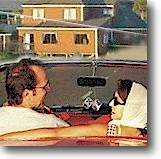|
Para que este curso te resulte efectivo, trata de
cumplir estos tres pasos:
1) Lee aquí
las instrucciones en español y
descarga e
imprime el PDF con el sistema de pronunciación.
2) Observa detenidamente la ortografía de las palabras en
inglés y lee en voz alta la
"pronunciación".
3) Realiza todas las actividades propuestas
en cada unidad de estudio. |
| |
|
 |
Seven
people talk about their family
Siete personas hablan de su familia
|

|
|
ACTIVITY
28: Esta
es una sesión de comprensión lectora donde leerás los comentarios de siete personas hablando de su familia. Después de
leerlos responde las preguntas en forma completa dentro de cada
casilla. Verifica luego las
respuestas correctas donde también encontrarás la pronunciación
escrita de cada texto. |
 |
"My
wife and I live in the suburbs. We drive to work, but we don't drive
together. We have two cars. Our children go to school by bus". |
|
1. Where do they
live? |
|
|
|
2. Do they drive
to work? |
|
|
|
 |
"My
parents live in the country. My father drives to work. My mother
doesn't work because she's retired now". |
|
3. Where do they
live? |
|
|
|
4. Does she work? |
|
|
|
 |
"My
sister has an apartment in the city. She lives alone. She walks to
work. She doesn't have a car". |
|
5. Where does she
live? |
|
|
|
6. Does she have a car? |
|
|
|
 |
"I
live with my mom and dad in the suburbs. I go to school every day with
my brother. We take the bus to school". |
|
7. Where does she
go every day? |
|
|
|
8. Does she take a
bus? |
|
|
|
 |
"My
husband and I live in a big house in the country. My husband still
drives his car to work every day, but I stay at home. I'm retired". |
|
9. Does she have a
house? |
|
|
|
10. Does she work
every day? |
|
|
|
 |
"I
live downtown in an apartment. I live alone. I don't need a car
because I walk to work". |
|
11. Where does she
live? |
|
|
|
12.
Does she live
with a friend? |
|
|
|
 |
"My
husband and I live in a nice house in the suburbs. We have a son and a
daughter, and we have two cars. I drive my car to work every day". |
|
13. Where does she
live? |
|
|
|
14.
Does she have
three children? |
|
|
|
|
|
|
|
¿EVERY
DAY O EVERYDAY? |
|
EVERY
DAY (évri déi) significa on all days
(cada día, todos los días, diariamente). Ejemplos: She
cleans her house every day (Limpia su casa todos los días); Every
day
I take a bath in the morning (Todos los días me baño por la
mañana), |
|
En
cambio EVERYDAY (évridei) es un
adjetivo que significa diario, corriente y se usa delante de un
sustantivo. Ejemplos: You can buy everyday objets in this shop (En
esta tienda puedes comprar objetos de uso diario), |
|
¿UN
EJEMPLO MIXTO O COMBINADO? |
|
EVERY DAY
Martha buys bread for EVERYDAY use.
(TODOS LOS DIAS Marta compra pan para uso DIARIO). |
|
En
la página siguiente estudiarás el primer diálogo de esta unidad
... |
|
|